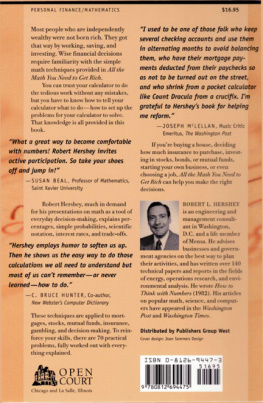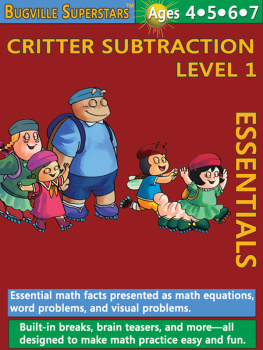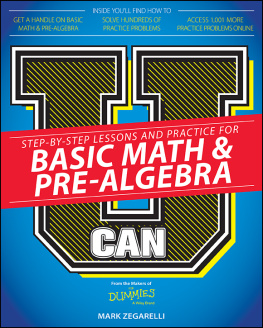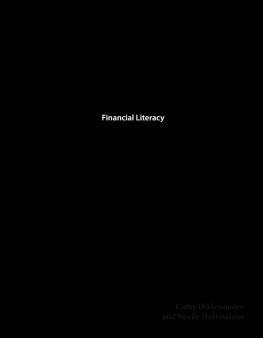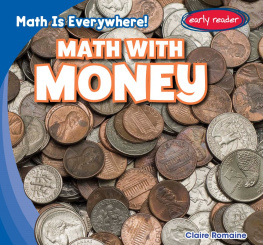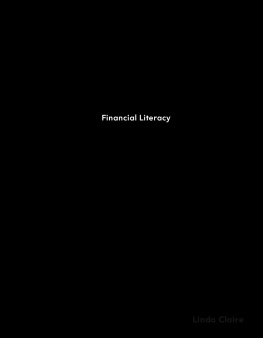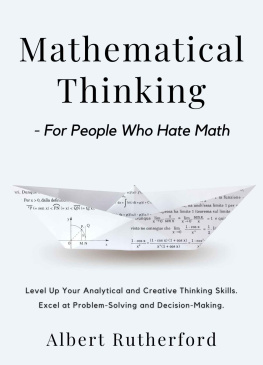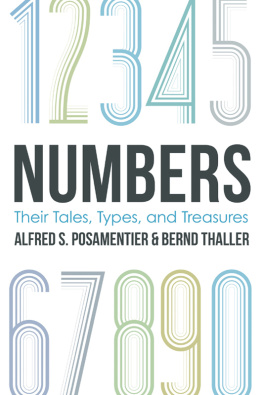All the Math
You Need
to Get Rich
All the Math
You Need
to Get Rich
Thinking with Numbers
for Financial Success
ROBERT L. HERSHEY

OPEN COURT
Chicago and La Salle, Illinois
To order books from Open Court, call 1-800-815-2280.
Open Court Publishing Company is a division of Carus Publishing Company.
2002 by Robert L. Hershey
1982 by William Kaufmann, Inc.
All the Math You Need to Get Rich includes some material originally published in How to Think with Numbers (Los Angeles: Kaufmann, 1982).
First printing 2002
Second printing 2002
Third printing 2002
Fourth printing 2002
Fifth printing 2002
All rights reserved. No part of this publication may be reproduced, stored in a retrieval system, or transmitted, in any form or by any means, electronic, mechanical, photocopying, recording, or otherwise, without the prior written permission of the publisher, Open Court Publishing Company, 315 Fifth Street, P.O. Box 300, Peru, Illinois 61354-0300.
Library of Congress Cataloging-in-Publication Data
Hershey, Robert L., 1941
All the math you need to get rich: thinking with numbers for financial success / Robert L. Hershey.
p. cm.
ISBN 0-8126-9447-3 (alk. paper)
1. Finance, PersonalMathematics. 2. InvestmentsMathematics. 3. ConsumersDecision-makingMathematics. 4. Business mathematics.
I. Title.
HG179 .H452 2001
332.024'001'513dc21
2001036609
Table of Contents
This book is designed for a very specific task: to give you, in the simplest form, all the math you need to deal with practical problems of everyday life. Such problems, if they involve math at all, are nearly always financial.
Only simple arithmetic is required. This book has nothing about algebra, geometry, trigonometry, or calculus, because those topics have no practical application for ordinary people in their daily lives. Those branches of mathematics have no bearing on the decisions you will make about jobs, taxes, insurance, saving, investment, or buying a house.
The mathematical topics that are covered in this book are simple, and are explained very straightforwardly. If you want to make sensible financial decisions, you absolutely must learn these topics, and you must get to know them thoroughly. A hazy recollection is not good enough: you need the instantaneous certainty that comes from total familiarity. The way to acquire that total familiarity is to work carefully through this book, and to do this several times if necessary, until it is all second nature.
If you have forgotten everything you learned about math in school, or if you were taught badly so that you never really got it, then you may have to go through this book several times. Dont be discouraged: your difficulty with math is itself largely due to lack of familiarity, and will automatically evaporate as you become more used to it.
If you have a natural flair for math, or if you use math in your job, it is still entirely possible that you are not quite confident about some of the ways you should think about everyday financial or business matters. Although you may find this book too simple, its still worth your while to go carefully through it, without skimming or skipping, to make sure that every step is completely clear in your mind.
This book tests your growing familiarity by showing how simple problems are solved. To test yourself, when you get to a problem, you can try to solve it yourself, then compare the result with the solution given in the book.
This book is called All the Math You Need to Get Rich. It is not called All You Need to Get Rich. Other qualities are needed to improve your financial position: perseverance, concentration, and good judgment, for instance. This book cannot give you those qualities, though it will help somewhat with the good judgment. What this book does offer, however, is absolutely essential: a thorough knowledge of that small portion of mathematics which is vital for understanding your economic decisions.
Most people who are comparatively wealthy by the age of 60 were not born wealthy. They got that way by hard work and careful decisions. In making these decisions, total familiarity with some practical mathematical concepts is indispensable.
Though limited in scope and designed for practical use, the math that this book teaches is perfectly sound and correct, so the book can be used in schools, by parents to help their kids with school math, or as a remedial aid for those who need some mathematical brushing up. The topics covered are: simple percentages, simple probabilities and mathematical expectation, scientific notation, rates of return, and trade-offs.
All the Math You Need to Get Rich grew out of an earlier book I wrote called How to Think with Numbers, published in 1982. Since then, pocket calculators have become dirt cheap. This is a wonderful step forward: it means that you do not have to perform difficult computations. The calculator will do that for you. All you have to do is to set up the problem and punch in the numbers. But you do still have to know how to set up the problem!
Another change since 1982 has been the vastly increased interest in investment. Far more people are investing in stocks and stock mutual funds. Stock index funds are readily available, such as the ones keyed to the Standard and Poors 500 stock average. Money market mutual funds are also used by many people today. These investment choices are out there. Everyone should know about them and know about the math involved in investing. All the basic concepts are explained in this book.
This book would not have been possible without the efforts of David Ramsay Steele, Editorial Director of Open Court. I also wish to thank Richard Miniter who suggested this book and steered me to Open Court. Carolyn Frank helped in the proofreading. Andrea Millen Rich encouraged both How to Think with Numbers and All the Math You Need to Get Rich.
The Story of Ug
Once upon a time there was a poor caveman named Ug. He was poor because he didnt know how to count past 5. You see, Ugs counting ability was limited to counting on the fingers of one hand. For any number bigger than 5, he ran out of fingers and he just said there were many. Ug thought that his system was just greateasy and not too much thinking. There were times, though, when he had an inkling that not being able to count higher was costing him something. Even though poor Ug couldnt count past 5, he was an excellent fisherman. He was hardworking and patient and almost every day he caught 20 to 30 fish. Ugs neighbor, Slik, wasnt nearly as good a fisherman; he only caught six or seven fish per day. But Slik did know how to count!
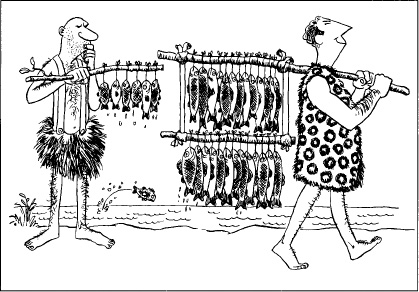
This evening, as every evening after the days fishing, Slik showed up at the entrance to Ugs cave holding six fish. He always timed his appearance to be there just as Ug came back from the lake with his big string of fish.
Many for many, offered Slik. Fair trade.
Fair trade, said Ug, handing over 27 fish and accepting 6 fish in return.
Poor Ug made the same deal with Slik every day of his working life. He couldnt figure out why he and his wife, Nag, and his son, Ig, were always feeling hungry. After all, they had many fish to eat, just like Sliks family, who always seemed to be fat and contented. Poor Ug suspected that the problem might have something to do with counting past many. He never was able to figure it out until his dying day, which came quite a bit earlier than it should have because of malnutrition.
Next page
